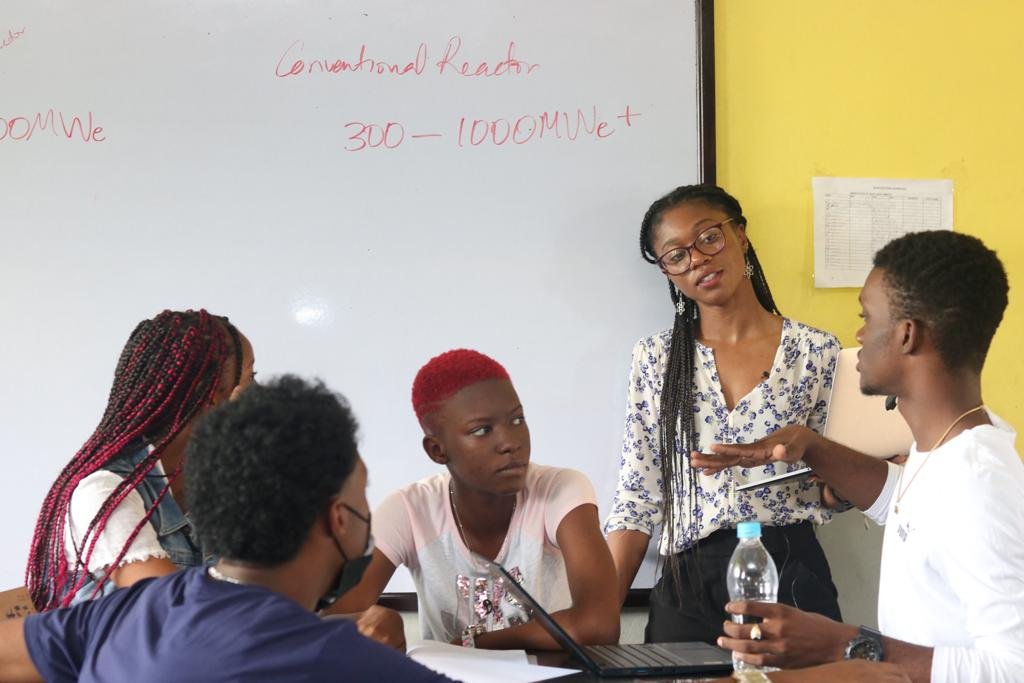Charlyne Smith, Caribbean Nuclear Energy Advocate, Breakthrough Institute Analyst, October '23
Meet Charlyne Smith, the woman trying to bring nuclear energy to Jamaica and the first black woman to graduate from the University of Florida with a PhD in nuclear engineering.
Charlyne Smith grew up in the Jamaican heat. Sweltering and unforgiving, it’s the type of heat you cannot escape. In the summer it reaches levels where the chickens die in their coops.
Restrictive energy policies towards the developing world are easy enough to make from the comforts of rich nations with abundant, cheap electricity and instant heating and cooling.
Smith, a nuclear engineer and advocate originally from Jamaica, however, encourages people promoting such ideas to step in the shoes of people who suffer in extreme heat, a lack of air conditioning, and blackouts.
“Spend the long hot summer in Jamaica. Not at a resort, not in Montego Bay,” Smith said. “No. Real Jamaica.”
Smith was inspired by the experiences of blackouts and unreliable electricity to enter the energy field, to hopefully deliver clean, stable power to the electricity grids in the Caribbean.
Smith conducts qualitative and quantitative regulatory analysis for the nuclear think tank, The Breakthrough Institute, aimed at fast tracking advanced reactors in nuclear dominant countries like the U.S. for later export to countries like Jamaica.
As an activist, Smith promotes nuclear development in the Caribbean and beyond. In July she launched the first ever Nuclear Engineering Boot Camp in Jamaica, at her former high school alma mater. Since nuclear engineering as a discipline is not offered anywhere in the Caribbean, the program filled an important gap according to Smith.
Participants in the Nuclear Engineering Bootcamp, last July in Jamaica learning about reactor safety and safeguards. The program aims to train young nuclear engineers, a large gap in the Caribbean according to Smith. (Photo by Britney Mascoe, Time Captured Photography)
The boot camp, with over 30 students, consisted of a five day lecture series on neutronics, hydraulics, energy usage, and climate change, with a focus on how these engineering concepts could be applied to everyday life, including in Jamaica.
“The general goal of the bootcamp was to provide an introduction to nuclear energy as a whole but doing it in a way that was immediately addressing challenges on a technical level through formal education,” Smith said.
As a black woman from the Caribbean achieving a high status in the nuclear world, Smith has become a trailblazer.
In 2021, she was astounded to find that she was only the first black female to graduate from the University of Florida with a PhD in nuclear engineering.
“I think I definitely inspire a lot of people to think ‘there are people in this space that look like me, so that's something that I could go into’,” Smith said. “If there's nobody in the field that looks like me, that can be intimidating.”
While proud of the path she is carving, Smith said the potential to provide clean, reliable and cost effective energy to a region like the Caribbean was her main motivation in pursuing nuclear engineering. She said the potential for exponential socio-economic impact drove her forward.
At the beginning of her energy journey, when she moved to the U.S. in 2012 to enter studies that would allow her to enter the energy space, Smith supported solar as it was an abundant resource in Jamaica and seemed to make sense. Much of her undergraduate research involved how to detoxify the solar panel manufacturing process.
With time and research, Smith found solar performed unreliably and that Jamaicans pay disproportionately more for electricity than other countries, which led her away from solar and towards considering nuclear energy. Jamaicans spend around 11% of their disposable income on household electricity bills, compared to 4% in the United States and 2% in Haiti. Several reasons contribute to the proportionally higher costs, including a dependence on imported fossil fuels and high rates of system losses, including technical losses in transmission and distribution as well as energy theft. Smith said she believes nuclear can improve reliability and reduce electricity bills.
According to Smith, the Dominican Republic, Trinidad and Tobago, and Jamaica stand out as excellent candidates for nuclear energy within the Caribbean. Through her advocacy, Smith hopes to facilitate such deployment of nuclear energy, and said she ultimately sees herself branching out to other developing countries in Latin America and Africa as well.
For Smith, nuclear power offers a high-power, affluent future for these countries. As the world gets hotter, Smith said she believes everyone should have the right to the amenities like air conditioning.
As part of the Nuclear Engineering Bootcamp, students developed their own reactor designs which included potential industrial applications. Here, students engage in discussion about their reactor designs, while seeking clarification from Dr. Smith as they gear up to give their pitch for nuclear energy in Jamaica. (Photo by Britney Mascoe, Time Captured Photography).
While the regulatory infrastructure in Jamaica is only just emerging, having one research reactor, Smith remains optimistic about the future and said she could foresee commercial plants starting to develop 10 years down the line.
Due to Jamaica’s weak grid, unexpected power outages at generating plants periodically cause load shedding.
“A nuclear plant would strengthen the infrastructure in such a way that it would allow people to have constant electricity in a way that they don't,” Smith Said. “It would reduce the blackouts that we've had even this year in Jamaica because one of the generating units at the oil plant shut down.”
In the meantime, Smith hopes to continue educating the next generation through hosting engineering boot camps where there is a lack of engineers. Ultimately, she said she hopes this will translate to a widespread adoption of nuclear technology, including research and medical applications in addition to commercial power, leading to higher standards of living and a smaller impact on the environment.



